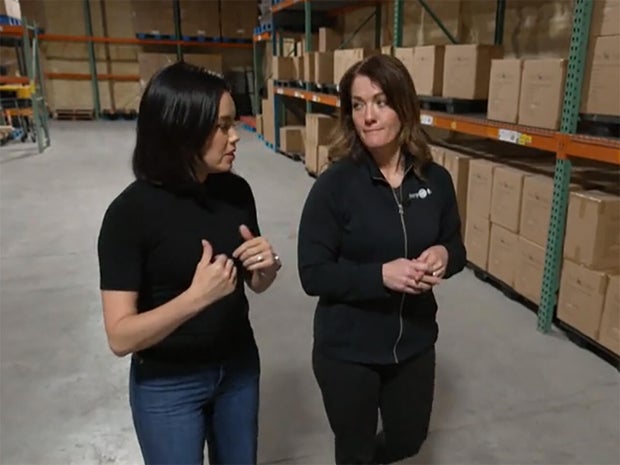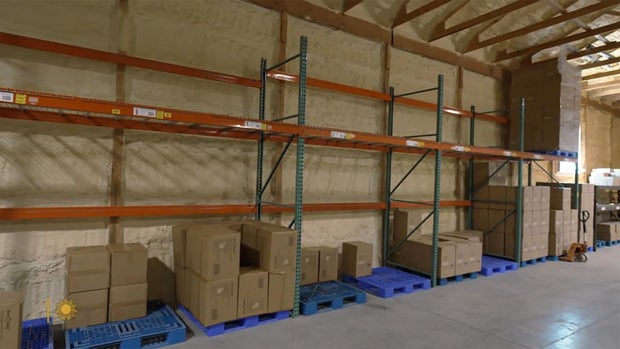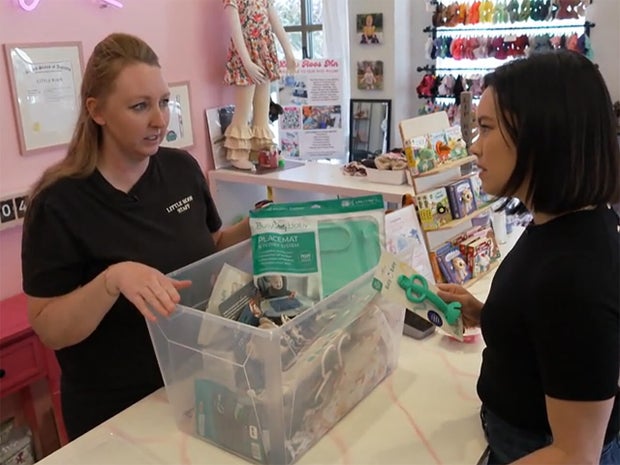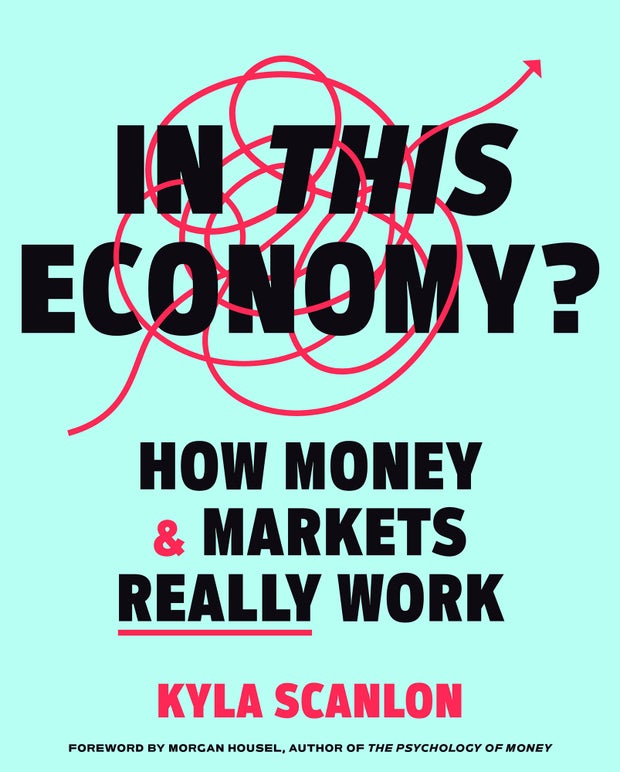Small business owners on damage from Trump's tariffs

Beth Benike is a mom, a veteran, and a small business owner – and she's sounding the alarm. "I've been telling all of my friends and family that anything you want for Christmas, to get it right now, especially if you're buying for children. If you are buying any baby products at all, get them while they're here, because they're gonna be gone."
After a decade serving in the Army, stationed in Bosnia, Kuwait, Iraq and beyond, Benike started Busy Baby, a Minnesota company that designs and sells placemats and utensils for babies and toddlers. All her products are made in China. And now, those products are subject to President Trump's 145% tax on Chinese imports.

"We have three months' worth of products sitting at the factory," Benike said. "And now, in order to get it here, we need $230,000 on top of what we've already paid for the product, just to get it in the country."
"Can you afford that?" I asked.
"Oh God, no," Benike replied.
"So, what do you do?"
"First, I sat on my kitchen floor and cried," Benike said. "And when I was on the floor in the kitchen, my son came in to show me something or tell me something, and he saw me sitting there, crying. My eight-year-old son. … And he put his arms around me and just hugged me. And, like, I realized I'm not gonna let him see this. This is not what we're gonna be."
The tariffs hit just after Benike struck a deal to sell Busy Baby products at Target and Walmart. To produce enough inventory, she took out a loan from the Small Business Administration. "That loan is partially SBA-financed, and then partially leveraged against my house," Benike said. "So, if I can't stay in business and pay those loans, I lose the house."
Inside Benike's warehouse, this is what's left:

Once this inventory is sold, Benike said, "then we're out of product. Then we're sold out. We've got nothing more coming in."
One of the retailers Benike supplies is Little Roo's, in Chaska, Minnesota. Owner Marissa Held-Nordling says she has seen shopper behavior change since tariffs were introduced. For the first time ever, she is allowing customers to stockpile baby registry gifts, like Benike's Busy Baby mats. That way, family and friends can still get what they need, often for baby showers months away.

"You can't just do a registry anymore, because the products aren't guaranteed that it's still going to be on the shelf," said Held-Nordling. "So, at this point I'm allowing people to come in and fill a bin, and they can get their exact colors … and then I close the bin and I take this product off my website."
While the U.S. and China begin trade talks, economists still expect most goods to get more expensive – or even go out of stock, from clothing to electronics to toys. Yale's Budget Lab says tariffs could add nearly $5,000 a year to families' household expenses.
Kyla Scanlon, an economic analyst and author of "In This Economy? How Money & Markets Really Work," said, "It's probably a smart time to take advantage of this weird, uncertain moment to make sure that you have what you need, just in case prices do get more expensive. If you don't need something right away, a lot of financial advisors would recommend that you do start padding your emergency fund, and putting some money to the side."
I asked, "Are these tariffs necessary to rebalance the global economy?"

"I don't think this was necessary," Scanlon laughed. "Targeted tariffs are okay. But when you do broad, blanket tariffs on everything, and when the rate is confusing, when small businesses don't know how to invest, they don't know what they should be spending money on – it's just not a good economic environment."
The legality of the Trump administration sidestepping Congress to implement tariffs is being challenged in the courts. President Trump says he imposed these tariffs in part to bring manufacturing back to the U.S.
When asked on NBC's "Meet the Press" if there were discussions about giving relief to small businesses, Trump replied, "They're not going to need it. They're gonna make so much money, if you build your product here."
But Benike says that's impossible – that manufacturing her products in the U.S. is too expensive: "The cost of land is higher here. The cost of insurance, the building, electricity, employees. And these factories that are producing now in the U.S., the raw materials they're bringing in are being tariffed as well."
It's an untenable situation, even for someone as successful as Benike. Just last week, she was recognized for her company's success – while she worried about its survival.
"I was in D.C. to receive my Small Business Person of the Year Award at the fanciest hotel in D.C., with my son in his adorable little suit and bow tie," she said. "And I just sat there feeling defeated. Where I would've loved to have celebrated that, now I have to prove it."
Still, she's not giving up. She's drawing inspiration from a phrase she picked up in the military: Improvise, adapt and overcome.
"So, Plan B is figuring out how to become a global brand," she said.
"And not sell in the United States?" I asked.
"For now," Benike said, adding, "It'll come back some day."
"You have faith?"
"I do. I have faith. It'll come back some day. This can't possibly last forever."
For more info:
Story produced by John Goodwin and Emily Pandise. Editor: Karen Brenner.
See also:
Cbs News






